Off Radar: The Best Stories You Missed This Week

The name game
It was bound to happen. This week we quit circling the drain and plunge right in to that godawful chestnut, what is a game? What makes a game a game? Should we just call them something less divisive? Why is everybody getting so upset about this? Why are you saying those terrible things about my mother?
But I hope this selection approaches the divisive (and often pretty boring) question in a way that informs more than it labels. It includes an essay calling out the selective outrage against Flappy Bird, a discussion about why "game" works well as a term, a fond remembrance of days when publishers greenlit spinoffs of spinoffs starring robot-piloting villainesses, and a letter from a woman in the fighting game community. It also includes two unusual and exciting examples of games you can play right from your browser, so get clicking.

Our Flappy Dystopia
"Because of social justice activism and outside pressure from a society that sees gaming as grotesque, awareness about how exclusionary games are is at critical mass and the industry is scrambling to answer. It has no fucking clue how to market to and include minority members of their community and in the world at large. So when Farmville, Peggle, Candy Crush Saga, and Flappy Bird appeal to this mysterious audience big budget and scrappy indies cant seem to tap, its foul play. They are exploitative and unfair."
Mattie Brice addresses the gaming community's synchronized revulsion to Flappy Bird in her blog, where she observes a link between the tiny one-person project and massive free-to-play empires. I'd add that the fear and loathing "hardcore" gamers feel for "casual" games springs in part from how transparently capitalist those games are, not just for their success in appealing to a broader audience. Their developers directly monetize parts of the experience instead of charging money up front. To people who are used to paying once and playing forever, this feels dishonest and manipulative.
Know what else is dishonest and manipulative? Most trailers. It's unfortunate that the gaming community chooses to hate one method while blithely accepting the other, and Brice attributes much of this to xenophobia - the same xenophobia that sparked a million gatekeeping arguments about what is or is not a game. Anyway, this was a bit of a tangent on the one thing I feel qualified to address here; Brice makes many more keen observations about games' place in society, so, uh, read.
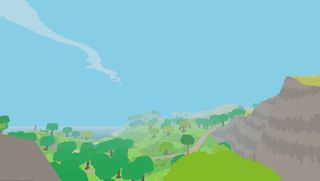
No Alternative
'Strictly speaking we have no interest in changing games at all, except for the creation of an area where our work can be enjoyed. But more generally speaking, we feel the world is in dire need of a new art form that can speak to the current concerns of people in a way that is sufficiently accessible. We feel videogames can play this role in society, potentially better than any other current medium.'
I wouldn't touch most conversations about what should and shouldn't be called a game with a 39-and-a-half foot pole. They're academic circle jerks at best, vile, reductive shouting matches at worst. Fortunately, that poor company just makes Joel Goodwin's blog piece about alternatives to the label look even more thoughtful by comparison.
Goodwin spoke with creators behind several of the games that tend to come up in those excruciating conversations--Dear Esther, The Path, and Proteus among them. The consensus seems to be that other intellectual labels like "ludic artifact" or "interactive experience" are fun, but ultimately too cumbersome to expect regular people to use. No, we'll just have to keep using the term until all the preconceived rough edges are worn down "like an old pebble," to quote one of Goodwin's sources. I'll start. Game. Game. Game.
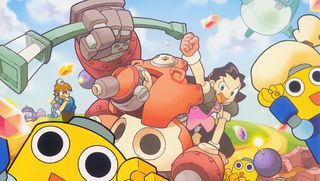
In PlayStation's Misadventures of Tron Bonne, an Echo of Better Days
"Misadventures is one of those fantastic PlayStation gems that's only come to seem better with the passing of time. It's not just that it's a relic from an age when we were practically drowning in Mega Man games, all of which were pretty good, but it also represents a bygone era when publishers could afford to dabble in a frivolous side project like this, and it could be wonderful. Despite being a quirky little experimental side project, Misadventures went a long way toward enriching the Legends universe (many of its concepts and characters appeared in Legends 2)."
The Misadventures of Tron Bonne would almost certainly be characterized as a misadventure by if it was submitted to a Capcom greenlighting committee today. Not the fun kind of misadventure where you tie your neighbors' dog to your wagon and end up somewhere in the next county, though, the kind of misadventure that ends in shame and "voluntary" resignations. It's a spin-off of Mega Man Legends, itself a spin-off of the platforming game series, and it barely even says Mega Man on the box! It stars a villain! Who is a girl!
Jeremy Parish laments in a piece for US Gamer the days in which such a strange project was tenable at a major video game company. It's not to say we don't have quirky games now, independent developers take care of that, and the big-budget studios even let one slip through now and then. But you just don't see many big franchises starring teenage villainesses and their legions of lazy, adorable robots any more.
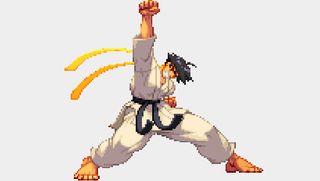
Anonymous letter to the fighting game community
"Why do you want to be another brick in the wall? Do you NOT want women in the community? If you do, you're going to have to make concessions. Maybe skip every other usage of the word bitch, maybe write 'get raped' out of your vocabulary. Proho too, fuck that shit. If a girl is sleeping with a player, well humans are humans surprise surprise. Guess what? She can pick up stick. She can ask questions. She can watch videos, she can learn, but if you've already labeled her as a non playing fake gamer attention whore"
This is a message from an anonymous woman who has been a part of the fighting game community for years. She remains dedicated to the sport and the people, but for every good moment she's gotten an equal serving of bullshit.
Posting this letter isn't meant to be an indictment of the fighting game community in particular. Awful attitudes toward women can be found in every corner of gaming enthusiasm. But here we have one woman's story and her calls for change. Sure, the account could be falsified--it's not signed, after all, there's no way to fact check it. But she's not trying to defame anybody. She's just trying to get some human decency from the community she and many other women have been a part of for years. Guys, the next time you see a woman singled out like this, remember the nail shop.
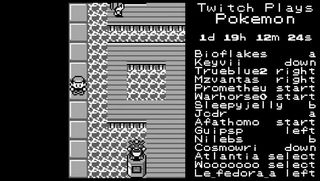
Twitch Plays Pokemon
Crowdfunding games is so 2012. The next big thing is crowdplaying games, and you can get in on the ground floor with this Twitch stream that uses messages from its chat participants to control Pokemon Red/Blue. Usually the collective consciousness makes the trainer wander into corners and try to use the Helix Fossil at every opportunity, but not always!
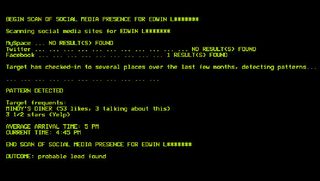
Fear of Twine
Twine, a program used to create hypertext adventures, can be used for all kinds of things. Debt, the game pictured above, impersonates an old green-screen computer terminal for controlling a bounty hunting murderbot. But wait, there's more! It's just one part of the "Fear of Twine" exhibition, which has 15 other unique Twine games to try.
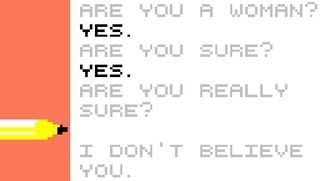
By any other name
Games aren't the only artform with a strangely broad name. Let's get real for a second: if "Snappy Answers to Stupid Questions" and "Ulysses" can both be books, its probably ok for Duke Nukem and Dys4ia to both be games. That said, if you have any of your own thoughts or external sources to share, make sure to hit us up in the comments below!
Want to dive deeper into the absurdity of labeling games? Try to guess these games by their outlandish Steam tags. Just want some more reading material? Check out these 10 great books about gaming history.

I got a BA in journalism from Central Michigan University - though the best education I received there was from CM Life, its student-run newspaper. Long before that, I started pursuing my degree in video games by bugging my older brother to let me play Zelda on the Super Nintendo. I've previously been a news intern for GameSpot, a news writer for CVG, and now I'm a staff writer here at GamesRadar.